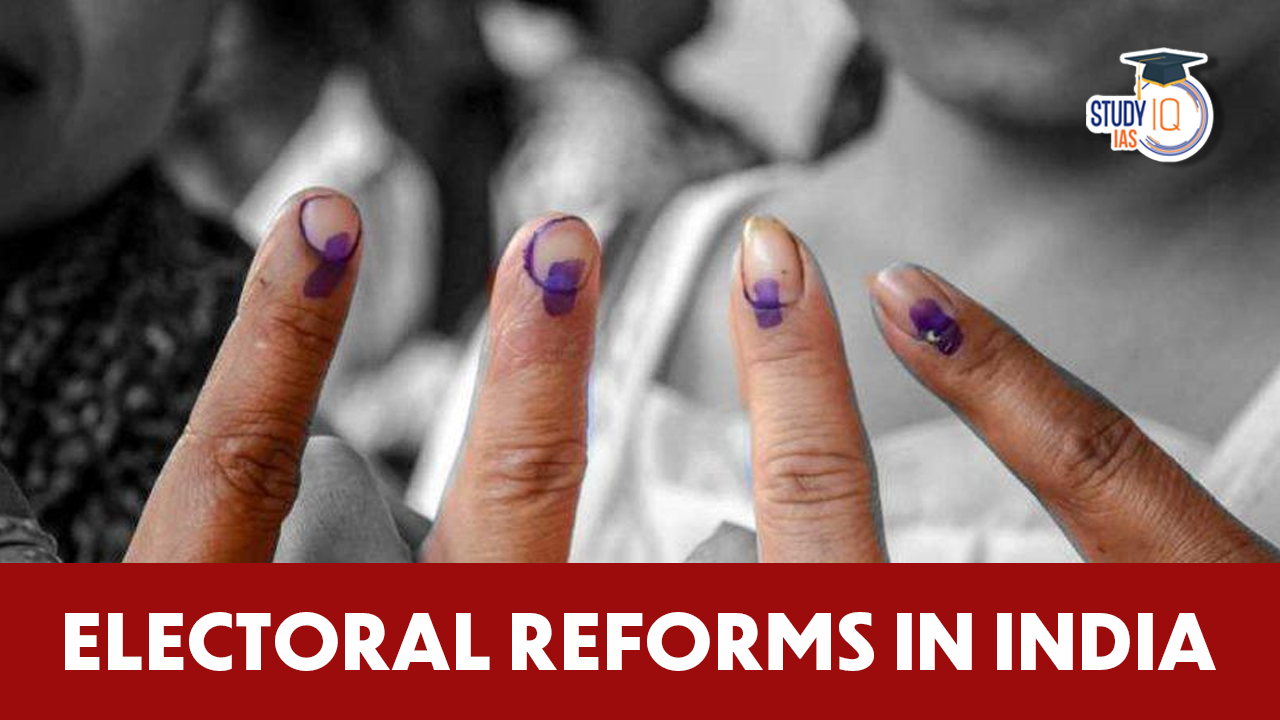
Electoral Reforms in India helps in making Indian democracy a real democracy in the letter as well as in spirit. Read all about Electoral Reforms in India, Challenges, Reforms & Issues for UPSC Exam.
Published On April 3rd, 2024

Table of Contents
India, with its vast population and strong democratic foundation, holds elections of immense significance. However, over time, several challenges have emerged, threatening the fairness and integrity of the electoral process. In response to these challenges, electoral reforms have been introduced to uphold the sanctity of the voting right and combat corruption. This article aims to delve into the major issues plaguing Indian electoral politics, followed by an exploration of the significant electoral reforms enacted to address these issues.
In India, the term “electoral reforms in India” refers to the evolution and modification of the electoral system. The Electoral Reforms seek to promote clean politics, free and fair elections, and ideal legislators. It contributes to making Indian democracy a true democracy in both letter and spirit. The Indian Constitution’s Articles 324 to 329 cover elections and the electoral process. Elections in India are now significantly safer for candidates and voters thanks to election reforms. Additionally, it has regulated the electoral process to eradicate election-related fraud.
Electoral reforms in India have been an ongoing process aimed at improving the electoral system’s fairness, transparency, and effectiveness. The need for such reforms arises from various challenges and issues faced by the electoral process, including corruption, malpractice, and inequality. Understanding the background of electoral reforms in India requires examining historical developments and the evolution of the electoral system.
| Stage | Description |
|---|---|
| Pre-Independence Era | Limited and undemocratic electoral system under British colonial rule. |
| Constitutional Framework | Establishment of electoral framework in the Constitution of India (1950). |
| Early Electoral Practices | Initial elections supervised by the Election Commission of India (ECI). |
| Emergence of Electoral Issues | Challenges such as corruption, criminalization of politics, and voter intimidation begin to surface. |
| Initiatives for Reform | Establishment of expert committees, legislative amendments, and administrative measures. |
| Landmark Reforms | Introduction of significant reforms addressing campaign finance, electoral administration, and voter registration. |
| Role of the Election Commission | ECI’s pivotal role in overseeing elections, enforcing laws, and promoting voter education. |
| Legal Framework | Amendments to electoral laws aimed at strengthening enforcement and enhancing credibility. |
| Public Discourse and Civil Society Engagement | Active involvement of civil society, media, and activists in advocating for reforms and raising awareness. |
Money Power: Campaigning for elections is an expensive process in any democracy, but it is particularly so in India. Money power has a detrimental effect on our electoral system, seriously impairing how regularly scheduled elections operate. It causes widespread corruption and plays a significant role in the black money industry.
Muscle Power: The results of physical power include silent and merciless booth capturing, most types of rigging, victimisation following an election, and pre- and post-election intimidation.
Politics being criminalised: The criminalization of politics and the criminalization of criminals, both of which are now openly practised, are two sides of the same coin and are principally to blame for the show of savagery at elections. Through the use of violence, criminals are able to win elections for their supporters.
Misuse of Government Machinery: It is a prevalent belief that the government in power at the time of an election will utilise improper means to promote the electoral success of members of its own party. Misuse of government resources can take many different forms, such as spending ministerial discretionary funds on personal expenses, using government vehicles for canvassing, and publishing advertisements at the expense of the government and the public exchequer to highlight their achievements.
Casteism: In some instances, specific caste groups have shown fervent support for specific political parties. As a result, political parties make concessions to appeal to various castes, and castes also attempt to pressure parties into providing tickets for the elections of their members. Caste voting is very common in the nation, which is a significant blemish on democracy and equality. Additionally, this causes rifts throughout the nation.
Communalism: The political ethos of pluralism, parliamentarianism, secularism, and federalism in India is seriously threatened by communal polarisation. Find out more about communalism in the article that is linked.
Absence of Moral Principles in Politics: Politics in India has turned into a business as a result of political corruption. People get involved in politics in order to increase their wealth and influence. There aren’t many politicians who want to improve the lot of their constituents. The Gandhian principles of sacrifice and service are absent from India’s political landscape.
An applicant may follow the development of his or her application using the Political Parties Registration Tracking Management System (PPRTMS).
Systematic Voters’ Education and Electoral Participation Programme (SVEEP): To inform voters, ECI organises voter awareness initiatives.
It is widely acknowledged that the country’s voting system has several flaws that need to be fixed over the years. But it should be done gradually and continuously, after much discussion and deliberation. Successive governments have recognised the significance of the concerns related to electoral changes at the Centre. Election reform recommendations from the Election Commission and various committees have occasionally been considered or put into practice. The administration acknowledged that electoral changes are an ongoing process and that all parties involved, including the government, the Election Commission of India, the Law Commission, etc., should work to adopt any suggestions for electoral reforms on which consensus can occasionally be reached.